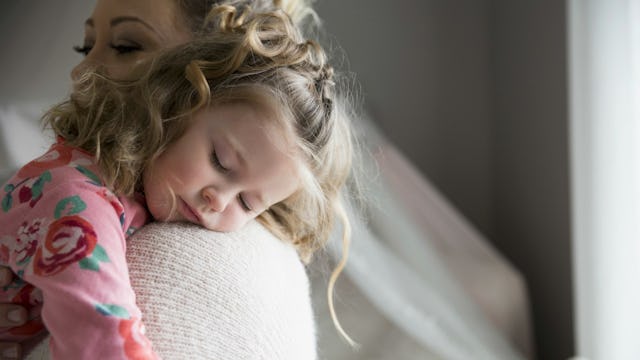Why I Am Going To Tell My Daughter About My Abusive Relationship

I’ve done a number of things which I’m ashamed of: I drew a knife on my brother and tried to stab my mother. I got blackout drunk and turned that same knife on myself. I tried to slit my own wrists. And — in hindsight — my “stripper days” are far from my proudest. What can I say is that I did degrading things for hundred dollar bills. But the most distressing thing in my past isn’t something I did, it is something I didn’t do — it is staying in an abusive relationship for years.
For ten long and painful years.
Make no mistake: I didn’t know what was happening, at least not at first. Not right away. I didn’t fall in love with a hateful man, or a violent man. In fact, the man I fell in love with wasn’t a man at all: he was a teenager. A boy. A child, one who loved video games and Stephen King. And while we shared a love for reading, writing, rock music, and angsty, angry poetry in the early days, we never shared blows.
Nothing suggested he would become an abuser, my abuser. But then he hit me.
He punched me in the face over a banana.
Of course, immediately after he apologized. I cried. He cried, and he said he was sorry. And, given our unassuming history, I accepted his apology. I chalked the incident up to booze. To a young, drunk 20-year-old who couldn’t handle his liquor.
But then it happened again, and again, and again. The violence escalated over time.
He pushed me, punched me, kicked me, and choked me; one night, he tried to drown me. He nearly killed me. And while I wish I would have done things differently — while I wish I would have left sooner, and stood up for myself quicker — I didn’t. Be it fear, shame, sadness, or ignorance, I didn’t leave.
But there is an upside to this nightmare. To my abusive history. Because the decade I spent living as a battered woman (and wife) has given me strength. It has given me power. “Life after” has given me a different perspective, and it has given me the opportunity to have a very personal conversation with my daughter about dating, relationships, and abuse.
Of course, I do not want to scare her. Love is beautiful a thing, and she deserves the chance to experience everything a good and proper relationship has to offer. I want her to know that love isn’t — and never should be — degrading. It isn’t — and never should be — controlling, and love is definitely not violent.
Love doesn’t hit you or hurt you or put you down.
I know this conversation will be a difficult one. Domestic violence is a complicated subject, at best. It is hard to talk about such painful things with our children. Hell, it is hard to talk about such painful things with our peers. With other adults. And it will be stressful and awkward and uncomfortable for us both. However, it is incredibly important we speak with children about domestic violence so they know the “signs.” So hopefully they can spot the red flags, and so they know that — if they are ever put in a dangerous situation — there is no shame in speaking up and getting out.
There is no shame in getting help.
And even through my daughter is still young — she is just 4 years old — it is something we talk about already. Well, sort of. I’m building the foundation now by telling her that no one has the right to hit her. No one is allowed to lay their hands on her. And I have told her that if she finds herself in any uncomfortable situation she should come to me (or another adult) for advice. That it is okay to speak up when she feels uncomfortable, even if she appears to be rude or impolite.
Does all of this guarantee she will be safe? No. In life there are no absolutes, and my words can only do so much. My stories will only take her so far. But I hope that, in talking to her, I empower her. I hope that I strengthen not only her will, but her self-confidence. Her voice. Her resolve. And I hope that, in time, she comes to understand what love is, and what love isn’t.
But most importantly, I hope she knows that I am always there for her. To talk. To laugh. To love. To listen. And to do so without shame, stigma, judgment or fear, because the only “wrong” conversation is the unspoken conversation: it is the one we fail to have.
Nobody had these talks with me as a child, and while they may not have saved me, they sure would have helped me during my lowest point.
For more information about talking to your child about domestic violence, visit Break The Silence.